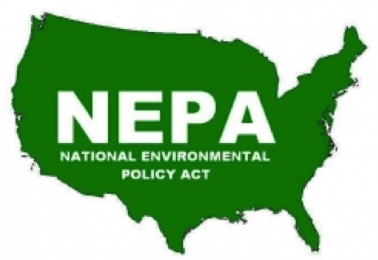BY BONNER COHEN,Ph.D.
Americans have good reason to gripe about the poor condition of many of our roads, bridges, tunnels, and other features of our deteriorating infrastructure.
Taxpayers are being taken to the cleaners by all levels of government. Wasteful spending by local politicians on politically fashionable bike lanes that clog up already congested streets, or light-rail projects that serve a miniscule percentage of the population, immediately come to mind. This is taxpayer money that would be better spent on maintaining and improving existing infrastructure than on virtue-signaling elected officials’ commitment to all things green.
But also standing in the way of vital infrastructure projects – both public and private – is a nearly 50-year-old federal statute that has come to symbolize Washington’s bureaucratic inertia, the National Environmental Policy Act (NEPA). Enacted in 1970, NEPA set up a cumbersome environmental review process that has caused many an infrastructure project to become bogged down for years while federal bureaucrats took their sweet time leafing through the voluminous paperwork required by the law. What’s more, the statute has been an open invitation to litigious environmental groups to challenge whatever project they dislike, adding time-consuming lawsuits to NEPA’s already endless red tape.
As a result, it takes an average of four and one-half years to complete a NEPA-required Environmental Impact Statement (EIS) plus many more years to settle the inevitable litigation.
When Congress passed the Obama administration’s stimulus bill in 2009, we were assured that billions of dollars would go to infrastructure projects that were “shovel-ready.” The shovels may have been ready, but NEPA wasn’t. The projects were put on hold for years, trapped in NEPA’s morass, prompting even Obama to acknowledge that “the shovel-ready projects weren’t as shovel-ready as we thought.”
Trump Executive Order
Early on, the Trump administration recognized the importance of not allowing NEPA to continue thwarting efforts to upgrade the nation’s infrastructure. In a statement issued a few months after taking office, it noted:
America needs increased infrastructure investment to strengthen our economy, enhance our competitiveness in global trade, create jobs and increase wages for our workers, and reduce the cost of goods and services for our families. The poor condition of America’s infrastructure has been estimated to cost a typical American household thousands of dollars each year.
On August 16, 2017, President Trump issued Executive Order 13807, “Establishing Discipline and Accountability in the Environmental Review and Permitting Process for Infrastructure Projects.” It instructs federal agencies falling under NEPA’s jurisdiction to “make timely decisions with the goal of completing all Federal environmental reviews and authorization decision for major infrastructure projects within 2 years.” The executive order defines major infrastructure projects as those requiring multiple authorizations from federal agencies.
Steps are already being taken to implement the executive order. The Department of Interior has capped the number of pages for an EIS at 150 or 300 pages for “unusually complex projects excluding appendices.” Any EIS that exceeds the page limit must obtain the approval of the assistant secretary responsible for the project.
Not meeting deadlines is a time-honored Washington tradition that leaves applicants in the lurch for months, if not years. To guard against this, the department has set a goal of completing “each Final EIS for which it is the lead agency within 1 year of an issuance of a Notice of Intent (NOI) to prepare an EIS.” Any foot-dragging by bureaucrats tasked with producing an EIS that exceeds the one-year time limit by three months must be approved by the assistant secretary assigned to the project.
In a perfect world, Congress would completely rewrite and simplify NEPA, bringing long-overdue common sense to a statute that serves the narrow interests of bureaucrats, lawyers, and green activists. But that world is nowhere on the horizon so, in the meantime, the Trump White House’s administrative reforms are a step in the right direction.
Bonner R. Cohen, Ph. D., is a senior policy analyst with CFACT.
